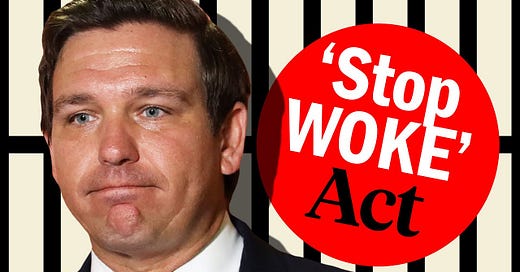The morning, after the midterm elections, I shared the relief of many around me that American democracy wasn’t dead. Yet, the outcome in Florida was particularly disheartening – Governor Ron DeSantis won by a 20 percentage point lead and Senator Marco Rubio beat his Democratic opponent representative, Val Demings by more than 16 percentage points. I am by no means a die-hard Democrat, in fact, I find the red-blue binary of American politics terribly restrictive – so my disappointment didn’t come from any prior, unwavering political loyalty to the Democratic party, rather the cloud of darkness that descended upon me had everything to do with DeSantis’s attack on academic freedom. In April, DeSantis signed House Bill 7 into law. Dubbed the Stop WOKE Act, this law strikes at the heart of the mission of education, in general, and higher education in particular. By prohibiting the teaching of anything that could result in anyone feeling “guilt, anguish or any form of psychological distress” due to their race, color, sex or national origin, this Act essentially curtails the freedom to think and shortchanges students by limiting their education. DeSantis’s midterm victory, I was convinced, would only strengthen his resolve to tighten his grip on public education.
But then, on November 17, just a little over a week after the midterms, a ray of light broke through the gloom. US district court judge, Mark Walker granted a temporary injunction against the law on the grounds that it violates the first amendment rights to free speech and 14th amendment rights to due process on college campuses. Judge Walker’s decision came in response to the legal challenge that the Foundation for Individual Rights and Expression (FIRE) helped mount on behalf of University of South Florida history professor, Adriana Novoa, and student, Sam Rechek, president of the student organization, First Amendment Forum. (To listen to the Banished episode where the two co-plaintiffs and FIRE attorney, Adam Steinbaugh talk about this case click here).
Opening his injunction with a reference to George Orwell’s 1984, Judge Walker said, “‘It was a bright cold day in April, and the clocks were striking 13,’ and the powers in charge of Florida’s public university system have declared the state has unfettered authority to muzzle its professors in the name of ‘freedom’.” He went on to say,
Under this act, professors enjoy ‘academic freedom’ so long as they express only those viewpoints of which the State approves. This is positively dystopian.” Invoking Orwell again, Judge Walker continued, “It should go without saying that ‘[i]f liberty means anything at all it means the right to tell people what they do not want to hear’.
The Stop WOKE Act has a built-in contradiction: it proposes to fight indoctrination through indoctrination. Judge Walker homed in on this in his conclusion and said that by passing this Act,
[t]he State has responded to the fears of ‘woke indoctrination in university classrooms. But rather than combat ‘woke’ ideas with countervailing views in the ‘marketplace of ideas,’ the State has chosen to eliminate one side of the debate. This only highlights the problem with viewpoint discrimination -- in the name of combatting ‘indoctrination’ of one perceived orthodoxy, the State allows for ‘indoctrination’ in its preferred orthodoxy.
This fight for academic freedom isn’t something that should concern only educators. What is at stake isn’t just speech in the classroom but the future of this country, indeed democracy itself. Judge Walker did not mince his words when it came to underscoring the importance of academic freedom:
One thing is crystal clear -- both robust intellectual inquiry and democracy require light to thrive. Our professors are critical to a healthy democracy, and the State of Florida’s decision to choose which viewpoints are worthy of illumination and which must remain in the shadows has implications for us all. If our ‘priests of democracy’ are not allowed to shed light on challenging ideas, then democracy will die in darkness.
A spokesperson for the DeSantis administration said that the governor will appeal this ruling. The case is far from fully closed but this injunction certainly served as a ray of light.





This is exactly why we need a (non-ideologically captured) ACLU to come back from the dead.
What is good for Minnesota may not be good for Florida.
Folks in the Blue belts really should learn something about diversity of opinion. We do not want a monoculture in this country. Our diversity is one of our greatest assets. This is why the constitution was written to provide for greater powers to the states. It allows for a more diverse nation and better control of local issues by the people most affected. The founders were wise indeed. They had endured and escaped monoculture, and formed a more perfect union.